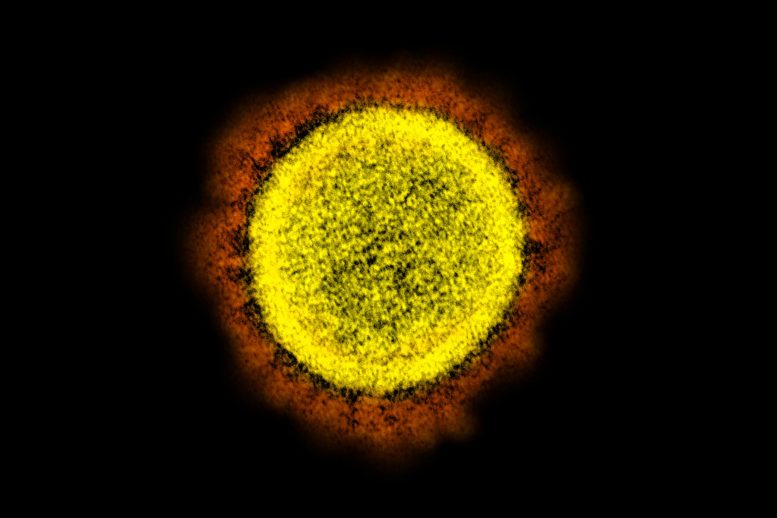
This colorized transmission electron micrograph shows a SARS-CoV-2 virus particle, isolated from a patient. Credit: NIAID
The combination of baricitinib, an anti-inflammatory drug, and remdesivir, an antiviral, reduced the time to recovery for people hospitalized with COVID-19, according to clinical trial results published in the New England Journal of Medicine. The study was supported by the National Institute of Allergy and Infectious Diseases (NIAID), part of the National Institutes of Health.
The clinical trial is the second iteration of the NIH Adaptive COVID-19 Treatment Trial (ACTT-2), a study protocol to evaluate therapeutics for people hospitalized with COVID-19. Remdesivir is a broad-spectrum antiviral treatment developed by Gilead Sciences, Inc. Baricitinib was discovered by Incyte and licensed to Eli Lilly and Company, and marketed under the brand name Olumiant. It is approved in more than 70 countries as a treatment for adults with moderately-to-severely active rheumatoid arthritis. Researchers hypothesized that because many severe symptoms of COVID-19 are caused by a poorly regulated inflammatory response, a therapeutic designed to target inflammation could be helpful for patients. The primary results of this study were first announced in September.
The ACTT-2 trial opened on May 8, 2020 and enrolled a total of 1,033 volunteer participants at sites in eight countries. Once enrolled, participants were randomized to receive a treatment regimen of either oral baricitinib tablets and intravenous (IV) remdesivir or oral placebo tablets and IV remdesivir.
In the study, the combination of baricitinib and remdesivir reduced the median time to recovery in hospitalized COVID-19 patients from eight days to seven days. Patients who required high-flow oxygen or non-invasive ventilation during their hospitalization appeared to have had the largest benefit: their median time to recovery was shortened from 18 days to 10 days. In addition, participants’ conditions at day 15 of the study (as measured by an eight-category ordinal scale which ranked the severity of their condition) were significantly improved when they received the two therapeutics combined. Recipients of the two treatments also had slightly fewer serious adverse effects.
The researchers caution that comparing this COVID-19 treatment regimen versus those with other therapeutics such as dexamethasone, is difficult without additional comparison studies. These results do appear to show that baricitinib plus remdesivir can benefit some COVID-19 patients and the combination deserves further clinical study, according to the researchers.
Reference: “Baricitinib plus Remdesivir for Hospitalized Adults with Covid-19” by Andre C. Kalil, M.D., M.P.H.; Thomas F. Patterson, M.D.; Aneesh K. Mehta, M.D.; Kay M. Tomashek, M.D., M.P.H.; Cameron R. Wolfe, M.B., B.S., M.P.H.; Varduhi Ghazaryan, M.D.; Vincent C. Marconi, M.D.; Guillermo M. Ruiz-Palacios, M.D.; Lanny Hsieh, M.D.; Susan Kline, M.D.; Victor Tapson, M.D.; Nicole M. Iovine, M.D., Ph.D.; Mamta K. Jain, M.D., M.P.H.; Daniel A. Sweeney, M.D.; Hana M. El Sahly, M.D.; Angela R. Branche, M.D.; Justino Regalado Pineda, M.D.; David C. Lye, M.B., B.S.; Uriel Sandkovsky, M.D.; Anne F. Luetkemeyer, M.D.; Stuart H. Cohen, M.D.; Robert W. Finberg, M.D.; Patrick E.H. Jackson, M.D.; Babafemi Taiwo, M.B., B.S.; Catherine I. Paules, M.D.; Henry Arguinchona, M.D.; Paul Goepfert, M.D.; Neera Ahuja, M.D.; Maria Frank, M.D.; Myoung-don Oh, M.D.; Eu S. Kim, M.D.; Seow Y. Tan, M.B., B.S.; Richard A. Mularski, M.D., M.S.H.S.; Henrik Nielsen, M.D.; Philip O. Ponce, M.D.; Barbara S. Taylor, M.D.; LuAnn Larson, R.N., B.S.N.; Nadine G. Rouphael, M.D.; Youssef Saklawi, M.D.; Valeria D. Cantos, M.D.; Emily R. Ko, M.D.; John J. Engemann, M.D.; Alpesh N. Amin, M.D.; Miki Watanabe, M.D.; Joanne Billings, M.D., M.P.H.; Marie-Carmelle Elie, M.D.; Richard T. Davey, M.D.; Timothy H. Burgess, M.D., M.P.H.; Jennifer Ferreira, Sc.M.; Michelle Green, M.P.H.; Mat Makowski, Ph.D.; Anabela Cardoso, M.D.; Stephanie de Bono, M.D., Ph.D.; Tyler Bonnett, M.S.; Michael Proschan, Ph.D.; Gregory A. Deye, M.D.; Walla Dempsey, Ph.D.; Seema U. Nayak, M.D.; Lori E. DoD., Ph.D. and John H. Beigel, M.D., 11 December 2020, New England Journal of Medicine.
DOI: 10.1056/NEJMoa2031994
The research was partially supported by NIAID grants UM1AI148684, UM1AI148576, UM1AI148573, UM1AI148575, UM1AI148452, UM1AI148685, UM1AI148450, and UM1AI148689. It also received support from the National Cancer Institute (NCI) under Contract 75N91019D00024, Task Order 75N91020F00010. For more information about the study, search ClincialTrials.gov using identifier NCT04401579.

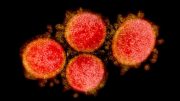

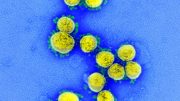

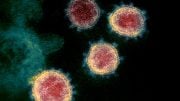
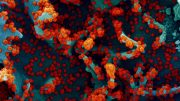
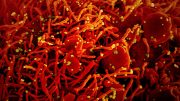
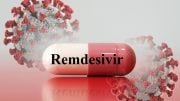
Here are clinical trials in which remdesivir failed to shorten hospital stays or reduce deaths:
https://www.medrxiv.org/content/10.1101/2020.10.15.20209817v1
https://pubmed.ncbi.nlm.nih.gov/33264556/
https://www.nejm.org/na101/home/literatum/publisher/mms/journals/content/nejm/0/nejm.ahead-of-print/nejmoa2023184/20201202/images/img_medium/nejmoa2023184_f2.jpeg
https://www.nejm.org/na101/home/literatum/publisher/mms/journals/content/nejm/0/nejm.ahead-of-print/nejmoa2023184/20201202/images/img_medium/nejmoa2023184_f3.jpeg
https://rebelem.com/remdesivir-in-moderate-covid-19/
https://www.ncbi.nlm.nih.gov/pmc/articles/PMC7190303/
The researchers who completed the 1,643-participant, New York City remdesivir clinical trial imply that in the ACTT-1 clinical trial, the sicker patients must have been sneaked into the placebo group to get the rigged result that got remdesivir approved:
https://www.medrxiv.org/content/10.1101/2020.08.10.20171637v1
https://link.springer.com/article/10.1007/s41669-020-00243-6
Remdesivir is totally useless against all viral diseases, including the flu, common cold, and Ebola:
https://www.nejm.org/doi/full/10.1056/NEJMoa1910993
https://www.nejm.org/na101/home/literatum/publisher/mms/journals/content/nejm/2019/nejm_2019.381.issue-24/nejmoa1910993/20191206/images/img_xlarge/nejmoa1910993_f1.jpeg
Remdesivir is fraudulently indicated for end-stage COVID-19 when in truth, it has absolutely no benefit in reducing the cytokine storm, in fact, might make it slightly worse:
https://www.nature.com/articles/s41591-020-1051-9
https://www.nature.com/articles/s41591-020-1051-9/figures/5
https://www.mdpi.com/tropicalmed/tropicalmed-05-00112/article_deploy/html/images/tropicalmed-05-00112-g004.png
https://finance.yahoo.com/chart/GILD
Remdesivir, hydroxychloroquine, and chloroquine cause cardiovascular QT interval prolongation and sinus bradycardia:
https://www.ncbi.nlm.nih.gov/pmc/articles/PMC7571425/
https://www.sciencedirect.com/science/article/abs/pii/S0022073620305835
https://www.ncbi.nlm.nih.gov/pmc/articles/PMC7598346/
https://www.ncbi.nlm.nih.gov/pmc/articles/PMC7682945/
Remdesivir causes liver damage:
https://theprint.in/health/govt-reviewing-remdesivir-use-for-covid-after-hospitals-report-liver-damage-in-patients/454169/
https://www.ncbi.nlm.nih.gov/pmc/articles/PMC7381904/
https://pubmed.ncbi.nlm.nih.gov/33006138/
Remdesivir causes kidney damage:
https://www.rxlist.com/consumer_remdesivir_rdv/drugs-condition.htm
https://pubmed.ncbi.nlm.nih.gov/33252992/
Remdesivir, Kaletra, and ribavirin worsen the skin rash problem during COVID-19:
https://pubmed.ncbi.nlm.nih.gov/33301232/
In Europe, ESICM now advises against remdesivir:
https://wkzo.com/2020/11/13/worlds-top-intensive-care-body-advises-against-remdesivir-for-sickest-covid-patients/